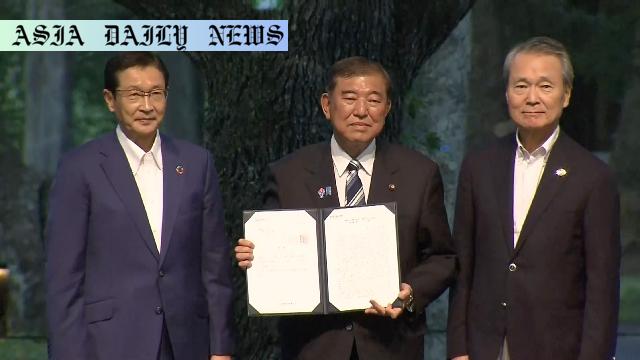Japan-US Trade Deal: Keidanren’s Chairman calls for measures to mitigate risks to the economy amid new challenges.
- Keidanren Chairman raises concerns about economic risks related to Japan-US trade tariffs.
- Tariffs of 15% on Japanese imports in the US add uncertainty for manufacturers.
- The government is urged to adopt measures ensuring Japan’s economic resilience.
- Japan’s reliance on other nations like the US and China is questioned in light of demographic concerns.

Japan’s Economic Resilience Amidst US Trade Tariffs
Japan’s recent trade agreement with the United States has raised important economic concerns, as emphasized by Keidanren, the Japanese Business Federation. At the conclusion of their summer forum held in Karuizawa, Chairman Tsutsui Yoshinobu presented Prime Minister Ishiba Shigeru with a detailed summary of their discussions. Central to this summary was a call for Japan to navigate the looming economic challenges by fostering greater self-reliance. This includes reducing the nation’s reliance on economic giants like the US and China, especially in light of Japan’s aging and shrinking population.
The newly signed agreement sets tariffs on Japanese imports to the United States at 15%. While viewed as a necessary alignment with current global trade dynamics, these tariffs will have significant economic repercussions for Japan. Manufacturers and key stakeholders have voiced concerns about the unpredictability these rates inject into business forecasts. Tsutsui highlighted the critical need to build resilient structures that can withstand such external pressures. His insights underscore the imperative for strategic planning and internal reforms to secure Japan’s economic stability.
Implications for Japan’s Business and Demographics
Beyond the immediate economic impact, the agreement raises broader questions about Japan’s demographic challenges. With a steadily declining population, the nation faces dwindling labor resources and reduced domestic consumption. Tsutsui’s statements reflect a broader sentiment within Japan’s business community—a recognition that securing economic independence and adaptability is crucial in addressing structural economic issues beyond foreign trade arrangements.
Moreover, the political climate adds another layer of complexity. Following significant electoral setbacks, Japan’s leadership faces harsh criticism and mounting pressure to address these growing concerns. Ensuring Japan’s economic durability amidst such internal and external challenges will require a multifaceted approach that aligns government policies with the aspirations and security of its industries.
Call for Strategic Economic Reforms
Tsutsui’s comments serve as a clarion call for Japan to craft measures that mitigate economic risks while fostering global partnerships. As export-heavy industries adapt to US tariffs, the role of innovation and diversification in maintaining Japan’s competitive edge becomes critical. Policymakers will need to focus on incentivizing growth in emerging sectors and fostering talent to meet the realities of a changing global economy.
Ultimately, the Japan-US trade deal presents both challenges and opportunities. While it highlights the necessity of navigating complex trade dynamics, it also emphasizes the importance of strengthening internal economic foundations. For Japan to thrive in this evolving landscape, it must prioritize resilience, adaptability, and innovation.



Commentary
Balancing Domestic Growth and Global Relations
The Japan-US trade deal sheds light on a delicate balance that nations must strike between maintaining healthy international relationships and safeguarding domestic economic interests. With the imposition of a 15% tariff on Japanese goods imported into the United States, a significant strain is placed on Japan’s manufacturers and broader business sectors. However, this trade deal is also a timely reminder of Japan’s potential to turn challenges into opportunities through strategic planning and innovation.
Reinforcing Economic Independence
Japan’s demographic realities—a declining and aging population—have created a pressing need for the country to ensure economic resilience and independence. Chairman Tsutsui’s observation about reducing over-reliance on major economic powers like the US and China is especially pertinent in today’s geopolitical landscape. By diversifying trade relationships and fostering domestic industrial strength, Japan can better insulate itself from external economic pressures.
The Way Forward: Adaptation and Innovation
While the tariffs present immediate challenges, they also offer an opportunity for introspection and reinvention within Japan’s economy. By investing in emerging technologies, crafting inclusive and incentive-based policies, and nurturing industries that show growth potential, Japan can position itself as a robust global player. Encouragingly, history has proven that Japan’s ability to innovate and adapt often turns crises into growth periods.
As stakeholders from various sectors call for robust measures to mitigate risk, the government’s response will be pivotal. Close collaboration between industries, policymakers, and international allies will underscore Japan’s readiness to evolve amidst the uncertainties of global trade dynamics while maintaining its unique economic identity.